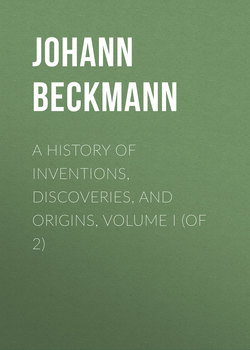A History of Inventions, Discoveries, and Origins, Volume I (of 2)

Реклама. ООО «ЛитРес», ИНН: 7719571260.
Оглавление
Johann Beckmann. A History of Inventions, Discoveries, and Origins, Volume I (of 2)
ADVERTISEMENT
TRANSLATOR’S PREFACE
MEMOIR OF THE AUTHOR
ITALIAN BOOK-KEEPING
ODOMETER
MACHINE FOR NOTING DOWN MUSIC
REFINING GOLD AND SILVER ORE BY QUICKSILVER
COLD OR DRY GILDING
GOLD VARNISH
TULIPS
CANARY BIRD
ARCHIL
MAGNETIC CURES
SECRET POISON
WOODEN BELLOWS
COACHES
WATER-CLOCKS, CLEPSYDRAS
TOURMALINE
SPEAKING-TRUMPET
ANANAS. – PINE-APPLE
SYMPATHETIC INK
DIVING-BELL
COLOURED GLASS. – ARTIFICIAL GEMS
SEALING-WAX
CORN-MILLS
VERDIGRIS, or SPANISH GREEN
SAFFRON
ALUM
FALCONRY
TURF
ARTICHOKE
SAW-MILLS
STAMPED PAPER
INSURANCE
ADULTERATION OF WINE
ARTIFICIAL PEARLS
PAVING OF STREETS
COLLECTIONS OF NATURAL CURIOSITIES
CHIMNEYS
HUNGARY WATER
CORK
APOTHECARIES
CLOCKS AND WATCHES
CLOCKS AND WATCHES1089 (ADDITIONAL)
QUARANTINE
PAPER-HANGINGS
KERMES. COCHINEAL
WRITING-PENS
WIRE-DRAWING
BUCK-WHEAT
SADDLES
STIRRUPS
HORSE-SHOES
FLOATING OF WOOD
LACE
ULTRAMARINE
COBALT, ZAFFER, SMALT
TURKEYS
BUTTER
AURUM FULMINANS
GARDEN-FLOWERS
Отрывок из книги
That the arts had their rise in the East, and that they were conveyed thence to the Greeks, and from them to the Romans, is universally admitted. Respecting the inventions and discoveries however of the earliest ages, nothing certain is known. Many of those most useful in common life must have been the production of periods when men were little acquainted with letters, or any sure mode of transmitting an account of their improvements to succeeding generations. The taste which then prevailed of giving to every thing a divine origin, rendered traditional accounts fabulous; and the exaggeration of poets tended more and more to make such authorities less worthy of credit. A variety of works also, which might have supplied us with information on this subject, have been lost; and the relations of some of those preserved are so corrupted and obscure, that the best commentators have not been able to illustrate them. This in particular is the case with many passages in Pliny, an author who appears to have collected with the utmost diligence whatever he thought useful or curious, and whose desire of communicating knowledge seems to have been equal to his thirst for acquiring it.
Of all those nations whose history has been preserved, the most distinguished are certainly the Greeks and the Romans; but, as far as can be judged at this remote period, the former were superior to the latter in point of invention. The Romans indeed seem to have known little, except what they borrowed from the Grecians; and it is evident, by their sending their young men of rank to finish their education in Greece, that they considered that country as the seat of the arts and the sciences, and as a school where genius would be excited by the finest models, while the taste was corrected and formed. From some hints given however by Pliny and other writers, we have reason to conclude that the Romans possessed more knowledge of the arts than the moderns perhaps are willing to allow, and that some inventions, considered as new, may be only old ones revived and again rendered useful.
.....
Besides the before-mentioned machines, he constructed, occasionally, several useful models. Among these were a loom for weaving figured stuffs, so contrived that the weaver had no need of anything to shoot through the woof25; a pedometer for putting in the pocket; a convenient and simple bed for a sick person, which was of such a nature, that the patient, with the least effort, could at any time raise or lower the breast, and when necessary convert the bed into a stool; and a carriage so formed, that if the horses took fright or ran away, the person in it could, by a single push, loosen the pole and set them at liberty. The two last models have been lost.
Every machine that this singular man saw, he altered and improved in the simplest manner. All his own instruments he made himself, and repaired them when damaged. But as he was fonder of inventing than of following the plans of others, he made them in such a manner that no one except himself could use them. Several of his improvements were, however, imitated by common workmen, though in a very clumsy manner. It is worthy of remark, that he never bestowed study upon anything; but when he had once conceived an idea, he immediately executed it. He comprehended in a moment whatever was proposed, and at the same time saw how it was to be accomplished. He could therefore tell in an instant whether a thing was practicable; if he thought it was not, no persuasion or offer of money could induce him to attempt it. He never pursued chimæras like those mechanics who have not had the benefit of education or instruction; and though this may be ascribed to the intercourse he had with great mathematicians and philosophers, there is every reason to believe that he would have equally guarded against them, even if he had not enjoyed that advantage. The same quickness of apprehension which he manifested in mechanics he showed also in other things. His observations on most subjects were judicious, and peculiar to himself; so that it may be said, without exaggeration, that he was born with a philosophical mind.
.....